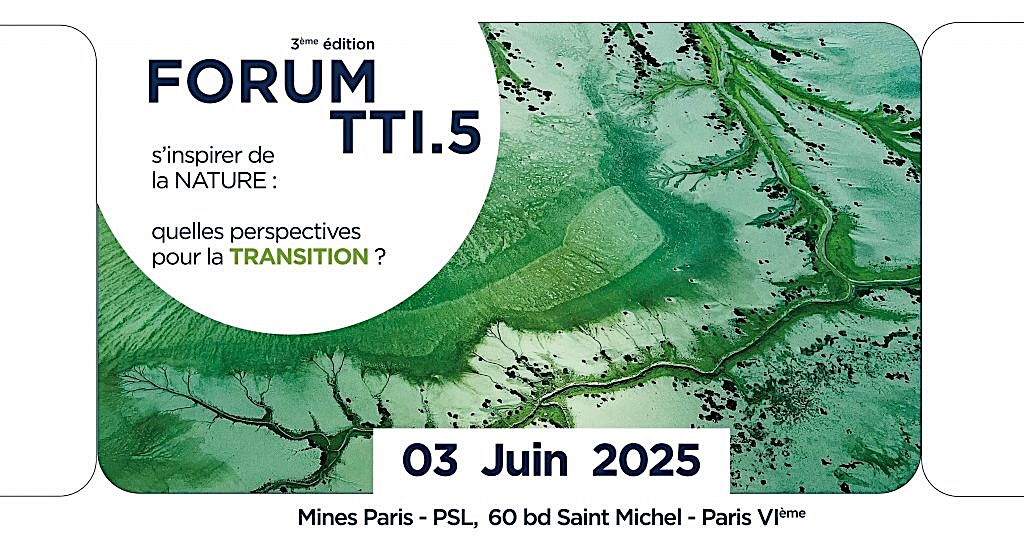
TTI.5 Award for the best case study of an environmental controversy
from the course ‘Description of controversies’
For the third consecutive year, TTI.5 The Transition Institute 1.5 has awarded the TTI.5 Award for best study of an environmental controversy. The prize is awarded to the best case study of a controversy dealing with an environmental issue, selected among the papers written by students of the civil engineering program of Mines Paris–PSL. The articles are written as part of the course Description of Controversies coordinated by Madeleine Akrich, sociologist and Research Director at the Center for the Sociology of Innovation (CSI-i3 – Mines Paris – PSL). . The prize was presented on June 3, 2025 at the 3rd TTI.5 Annual Forum, following a presentation of the three nominated projects and a vote by the public.
The winning group, represented by Fanny Picamal, Grégoire Leboucher and Alizée Cinquin, and also includes Flore Baize-Roch, Oriane Devigne, Virgile Richard and Kilian Varescon, is the author of the study entitled:
Le recyclage du plastique peut-il tenir ses promesses ?
Can plastic recycling live up to its promise?

Left: Prize winners Alizée Cinquin, Fanny Picamal and Grégoire Leboucher. Right: Madeleine Akrich, surrounded by Matthieu Mazière, Director of Studies at Mines Paris – PSL, and the students who presented their work. Photo credit: Catherine Gayda, i3.
Controversy description projects at Mines Paris – PSL
The course Description of Controversies is part of the curriculum for third-year students in the Civil Engineering program at Mines Paris-PSL. This course aims to educate engineering students about the evolution of their professional and civic context. The aim is to introduce them to the uncertain world of scientific and technical research by describing an object: a socio-technical controversy.
The topics proposed to the students have the following characteristics: an ongoing controversy, on a targeted subject (for example: not “GMOs” but “the problems raised by the authorization of the cultivation of a transgenic potato plant which is controversial in a specific period and in a specific territory”), involving a diversity of protagonists (scientists, experts, jurists, institutions, members of parliament, associations, etc.), for which various sources of information are available (general press, scientific press, professional press, discussion forums, blogs, websites, parliamentary reports, etc.).
The controversy study consists in a case study. A group of students follows a controversy in real time to discover its complexity and singularity. A team of sociologists specializing in the analysis of science and technology supervise the students in the development of a pragmatic and argued empirical point of view.
The three projects nominated

Le recyclage du plastique peut-il tenir ses promesses ?
[Can plastic recycling live up to its promise?]
The group’s work was presented by Grégoire Leboucher, Fanny Picamal and Alizée Cinquin.
The development of the plastics industry in the 20th century is widely criticized today. The damaging effects of plastic on health and the environment are at issue. Although recycling is presented as a solution to plastic waste, only a fraction is actually recycled; the rest often ends up in landfills or oceans. The very characteristics that make plastic attractive — its stability and durability — also make it difficult to recycle. The process is often complex and costly and can generate greenhouse gases and other pollutants. Controversial issues include the promise of plastics and recycling technologies, and the development of alternative materials such as bio-plastics. Read the article
L’agrivoltaïsme – Photovoltaïque en terre agricole : énergie d’avenir ou menace pour l’agriculture ?
[Agrivoltaics – Photovoltaics on farmland: energy for the future or a threat to agriculture?]
The group’s work was presented by Alice Machelon, Astrid Soulas, Marion Stenta and Théo Takla.
Agrivoltaic technologies are currently experiencing strong growth. Introduced twenty years ago, these technologies combine agricultural production and photovoltaic electricity generation on the same site. While they offer the potential to increase the area available for renewable energy production, they also raise a number of questions. Which crops are compatible with these infrastructures? Will this lead to a de facto reduction in arable land? Economic questions also arise. What is the profitability of these installations? What consequences might the entry of energy companies into this sector have on farmland prices? Ultimately, will agrivoltaics enable the combination of energy and agricultural production? Read the article
Cohabiter avec les rats – Une relation ambivalente ?
[Cohabiting with rats – An ambivalent relationship?]
The group’s work was presented by Augustin Le Corre, Piero Jaime Hinostroza, and Lilia Ben Mariem.
Garbage collectors on strike, large-scale works underway in the run-up to the Olympic Games… and the presence of rats in cities is back in the spotlight. Some consider them pests to be eradicated, while others consider them contributors to biodiversity. Either way, rats have become a subject of public debate, mobilizing elected representatives, citizens, doctors, and ecologists. Their numbers, the diseases and nuisances they cause, the methods used to control their proliferation, their usefulness – everything is a subject of controversy, and everyone wonders whether we should cohabit with rats. Read the article
Photo credit: #1-2: Catherine Gayda, “Presentation of the TI.5 Prize for the best study of an environmental controversy”, Mines Paris-PSL, June 3, 2025.
#3 : AI-generated image (Mistral, Le Chat). #4: Jenson, 2019. iStock. #5 : Image from Ratatouille, a film directed in 2007 by Brad Bird.

